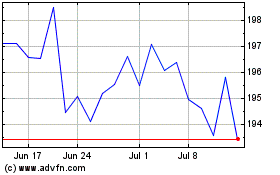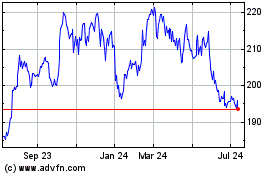Dubai Mercantile Exchange Eyes US Regulation As Volume Builds
November 02 2009 - 2:20PM
Dow Jones News
The Dubai Mercantile Exchange has asked U.S. regulators to ease
a key trading rule that its chief executive said is hampering
efforts to develop an oil-price benchmark.
The exchange has asked the U.S. Commodity Futures Trading
Commission to relax margin-calculation rules for traders on its
markets, cutting trading costs for its flagship Oman Sour Crude
contract.
"This would put us on a level playing field and remove the
barriers to trade," said DME Chief Executive Thomas Leaver, who
hopes to secure clearance this month.
However, tighter limits on commodities trading under
consideration at the CFTC could also affect the
two-and-a-half-year-old DME, which clears customer trades in the
U.S.
The DME's sour crude futures contract, launched in June 2007, is
among a host of products aimed at establishing a pricing mechanism
for the heavier crude oil produced in the Middle East.
Though it struggled to gain traction in its first 18 months,
Leaver said the Oman contract picked up some momentum after credit
markets dried up in the wake of the financial crisis last year, and
banks and oil companies redirected over-the-counter business to
regulated exchange platforms.
The DME reported Monday that trading volumes have grown 58% year
to date, with a record daily average of 2,624 Oman contracts
changing hands in October, topping a previous record set in
June.
But a CFTC rule for new exchanges, requiring customer margin
levels to be calculated on a two-day holding period, remains a drag
on volume, according to Leaver.
The rule makes it about 30% more expensive for investors to
trade Oman crude oil contracts, versus global benchmark contracts
like West Texas Intermediate and Brent crude, he said.
The DME wants to rectify this, submitting a request Sept. 30
that would put the Oman contract on equal footing with competing
contracts. Leaver said he hopes to get approval from the CFTC this
month.
Conceived as a joint venture among the New York Mercantile
Exchange, the United Arab Emirates' government development company
Tatweer and the Oman Investment Fund, the DME has been cited as a
potential beneficiary if tougher U.S. regulation forces energy
trade overseas.
Washington regulators are weighing rules that would cap the
level of trading done by so-called speculative commodity investors
- participants that aren't hedging direct commercial exposure to
commodities.
Such speculators have been blamed for the historic run-up in
energy and agricultural commodity prices in 2008.
But Leaver said that his market would be affected alongside U.S.
exchanges if the CFTC imposes tighter position limits on U.S.
commodities trade, because the DME clears futures trades through
Nymex parent CME Group Inc (CME).
"It's a double-edged sword for us," Leaver said. "We have the
same large position reporting requirements as CME and Nymex."
As it watches Washington, the DME is preparing to introduce
clearing for Oman crude swap products through CME's ClearPort
platform in early 2010. The move, which requires regulatory
approval, could bring more over-the-counter business to the
DME.
Leaver said the exchange this month also looks to introduce
intercommodity spread trading, linking Oman crude to WTI and Brent
varieties.
-By Jacob Bunge, Dow Jones Newswires; (312) 750 4117;
jacob.bunge@dowjones.com
CME (NASDAQ:CME)
Historical Stock Chart
From Sep 2024 to Oct 2024

CME (NASDAQ:CME)
Historical Stock Chart
From Oct 2023 to Oct 2024
